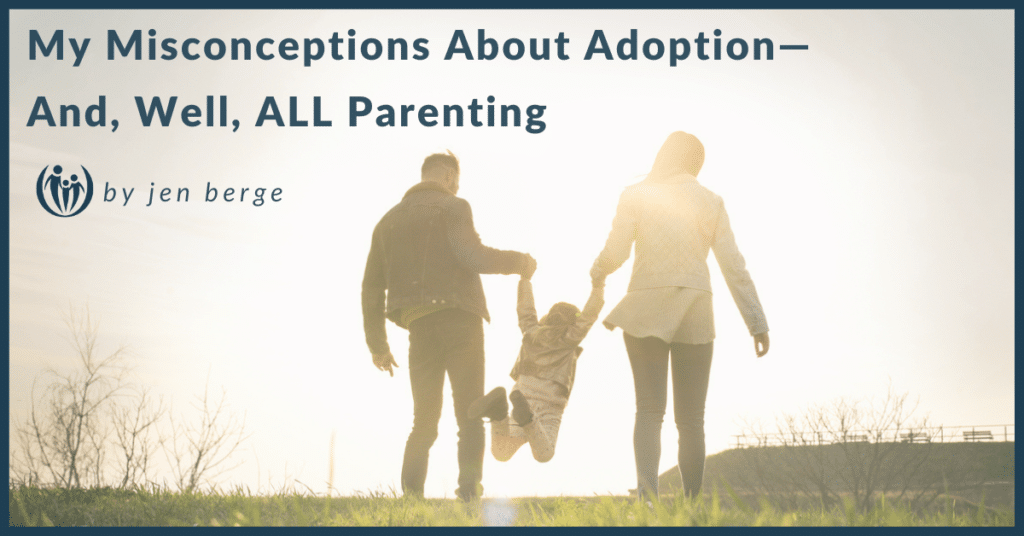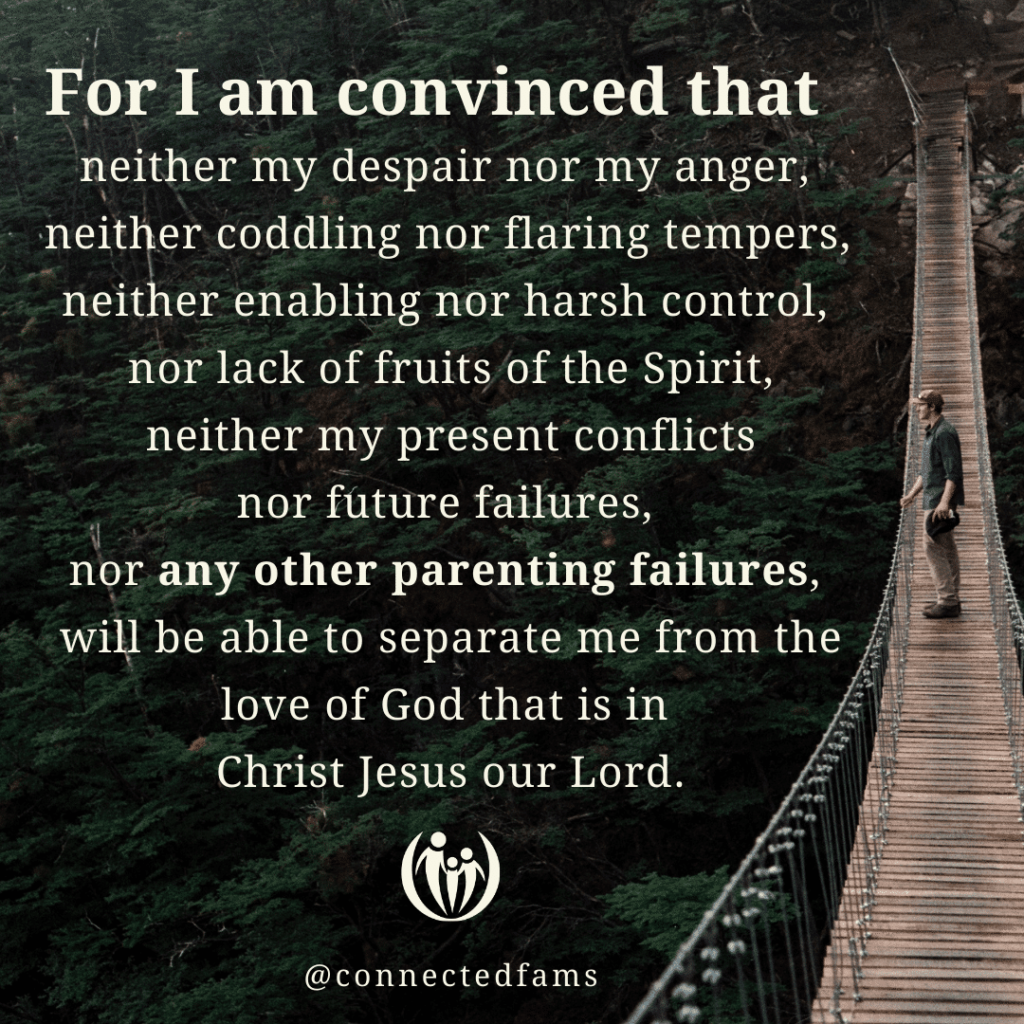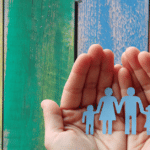
My Misconceptions About Adoption—And, Well, All Parenting

In honor of National Adoption Awareness Month, Jen Berge, a mom of six through birth and adoption, and our content manager, shares her insight on some common misconceptions about adoption. But we believe what she’s learned applies to all parents!
When we began our adoption journey in 2013, we did all the things. Our agency required a certain amount of education, but we went above and beyond.
We anxiously tried to prepare ourselves and our four biological children for anything that could come along in our growing family. Our daughters were coming from Haiti, and we knew that international, transracial adoption would come with its own set of complexities. We were also trying to prepare for whatever trauma our girls may have faced before coming to us.
Like I said, we did all the things.
- We learned from seminars, webinars, and online courses…
- We read books…
- We talked to friends who had adopted…
- We talked to adult adoptees…
- We took classes to learn how to help our four older biological children adapt to having new siblings…
All this was an effort to find out how to best parent, discipline, and raise a child (or children in our case) from another culture who had experienced the loss of their first family. Our focus was almost entirely on how to adapt our parenting style. We already understood that traditional parenting would not be as helpful with children from a background of trauma.
What we didn’t realize about our adoption journey
Our deepest desire was to create an environment where the daughters joining our family through adoption could grow and thrive in healthy ways.
But nothing—and I mean nothing—could have prepared us for the work we have had to do (and continue to do) on ourselves.
As it turns out, our adoption journey has brought significant individual transformation for my husband and for me.
It’s painful at times but so incredibly good and necessary. Does this sound familiar? You may be relating to how much the challenges of parenting have changed you!
Over the past few years, I have recognized that the Connected Families Framework contains essential messages not just for our children but for us! I’ve learned that the more I can hear the messages for myself, the more effectively I can pass those messages on to our kids.
FOUNDATION: I am safe (at peace) with myself
For a long time, I assumed if our family did all the “right” things to make our children feel both emotionally and physically safe, they would feel safe. (And then they would obey.) Automatically. Direct correlation. The more things we did to help them feel safe, the safer they would feel and the more compliant they would be.
Not so.
You see, kids can spot a fake (especially our wary kids who joined our family through adoption). They’ve learned to survive by reading body language and facial expressions. They know if we are just going through the motions. They know if there is a hidden agenda. And they can definitely spot if I am impatient, even if I’m trying to hide it.
There’s a saying, “When you are at ease with yourself, you are at peace with everyone else.” My kids know if I am not at peace with myself, and this can make them feel unsafe.
Safety is vital for all kids, especially those from hard places or with sensitive nervous systems because their lives have often felt out of control. When any child feels out of control, their coping mechanism is often to try and control others. This usually shows up as dysfunction and misbehavior.
I’ve realized that when I feel the need to control, I also sometimes misbehave and seek to control the situation (or others) in dysfunctional ways.
Why I struggled to be at peace with myself in my early parenting
If I could go back and do anything differently in my early years of parenting, 20+ years ago, I would take a deeper look at myself and what my own agenda was regarding parenting.
I often had concrete expectations about how my children should behave. And if they didn’t deliver, then I was doing something wrong. It was all on me. The more I felt I lacked control, the more I tried to control them.
When I have a goal to control my child, I set myself up for anxiety and frustration because controlling another human being is not a reasonable, achievable goal. That goal keeps me from being at peace with myself and my child.
With my own inner turmoil and conflict ever present, I’ve struggled at times to make our girls feel safe. When conflict erupts, I have had to learn to consistently ask myself, “What’s going on in me? Why am I so determined to control this situation?”
Only when I acknowledge that I have an agenda of my own can I start letting go of the need to control my children. And only then do my children begin their journey toward feeling safe around me.
I’ve noticed that all our kids trust me more now. They no longer seem to worry if I’m going to overreact, and they feel more comfortable talking to me about things (and choices) they are struggling with. Deep down, they are learning to understand that I am truly “for them,” which shows in how they approach me. It has been a rewarding journey that we are still on to this day.

CONNECT: I am loved by God, even when I make parenting mistakes
When we first brought our girls home, we put all our training and preparation to work. The to-do list was long, and we inevitably made mistakes. But we kept trying harder and harder, believing that if we got it right, things would go well for us all.
And we were exhausted. As mistakes piled on top of mistakes, we increasingly felt shame and self-doubt. Perhaps worst of all, we began believing lies about ourselves: “I can’t do this!”, “I’m not lovable myself,” or even, “God picked the wrong parent for this.”
Lies like these can permeate not only how we think about ourselves as parents but also how we think about our kids. I found myself thinking, “This child will never make it, and it’s all my fault.”
What I have come to understand is that parenting is a purifying process and probably one of the hardest things a person will ever do in life. And when you step into adoption (and/or foster care), the purification becomes that much more evident because of the impact of trauma and shame on kids.
Letting go of my shame and guiding my kids to let go of their shame
It is well-known in the adoption community that kids who have experienced trauma of any kind (and trauma can come in all shapes and sizes) often hang onto a shame-based identity. Shame is something they live with daily. But guess what? Parents face shame and fear, too. And that includes me.
Over the years, I’ve had to learn to face my personal shame about my parenting mistakes to better help our daughters work through their own (often misplaced) shame. One verse that has consistently encouraged me is Zephaniah 3:17:
The Lord your God is with you,
the Mighty Warrior who saves.
He will take great delight in you;
in his love he will no longer rebuke you,
but will rejoice over you with singing.
How amazing is it that the God of the Universe not only is with me but delights and rejoices in me and doesn’t rebuke me?!
My kids can’t realize they are loved no matter what until I accept that I am loved no matter what. God loves me in ways I can’t even imagine. His love is unconditional and steadfast and equips me to lead them toward the hope that Christ brings.
As we put them to bed each night, we tell our girls the same thing: “You are loved no matter what.” Sometimes, they feel so ashamed they don’t want to receive it, but we say it anyway. Because that’s what God does for us; He speaks Truth to our lies.

COACH: I am called for what God is asking me to do
Most parents experience feeling alone and overwhelmed at some point in their parenting journey. I am no different. It’s easy to be discouraged and think, “There is no way I am equipped to handle what God has brought my way.” But God has never left me. His promises are real, and I lean on that daily.
As we seek to walk in our calling to encourage our kids, a vital habit has been to evaluate our own feelings. Are we feeling overwhelmed and discouraged and inadvertently communicating unhelpful messages to our kids? It’s been eye-opening to think about how we might be inadvertently communicating unhelpful messages to our kids, especially when we’ve had a difficult interaction with them.
I remember one day, I was working in the kitchen and feeling particularly tired and overwhelmed. My sweet daughter was talking on and on and asking a lot of questions about things I didn’t feel like talking about at the moment. All of a sudden, she said, “Am I annoying?” Talk about a wake-up call. My body language was communicating to her that she was annoying. I had to tell her, “No, you are not annoying. Mom is just tired right now, and it has nothing to do with you.”
Resting in God’s promises
The Bible is filled with the promises of God—all aimed at reminding us that He will equip us for whatever good work He has for us (Ephesians 2:10). This applies to any parenting challenge that life holds. At our house, we work to rest in this. And it brings us great peace.
Sometimes, God uses others to communicate that we are capable and can overcome. And often in ways we don’t expect. I remember a day when I felt completely “over it.” Over having to parent. Over the energy it takes to parent six kids. Over it all. I wanted to get away. And then I opened my email. I had an email from a dear friend who said the following regarding her own struggles, which mirrored mine:
“Right now, [in this discouraging time], I just have to sit with sadness, make friends with it, and get through it. Then, I can resume being grateful for all of my blessings—which are many. Jesus is risen. God has a plan. He loves us and is with us. I am still grateful. For everything. Even through my tears.”
I have learned to surround myself with steadfast people who will help carry me when I feel like I can’t go another step in this journey. People who will preach to me when I need to hear it. People who will encourage me and walk through life’s daily messes with me. These friends and family have been a physical representation of how God cares for all of us. They are a gift and continue to show me I am called and capable, even when I don’t feel that way myself.
When you believe that God will equip you and provide you with the resources and people you need in your life, you can parent from a place of confidence. And when kids feel your steadfast and strong confidence in God’s plan, it boosts their own confidence that they too are called and capable of walking in the plan God has for their lives.
CORRECT: I am responsible for my parenting
Perhaps the most challenging step of the framework (especially if you were raised with traditional parenting) is the need to recognize when you’ve blown it and apologize to your kids when appropriate.
At our house, we use The Peace Process, which is taught in the Sibling Conflict online course. It has increased our kids’ self-awareness and encouraged them to own their mistakes and reconcile.
But here’s the catch: the parents at our house use The Peace Process, too.
If you’ve ever felt the need to apologize to your child, you know it can feel humbling and discouraging. And you worry it will undermine your authority. But the truth is, it does the exact opposite. By owning your mistakes and then making things right, you are modeling for your kids the humility and grace that comes from God to all of us.
Is it hard to apologize to your kids? Absolutely.
Is it worth it? Absolutely.
Can I guarantee that my kids will start apologizing on their own when I model it for them?
Nope.
When I am able to peacefully and confidently show my kids what true humility looks like by apologizing and “making things right,” it opens the door for them to do the same.
Putting grace at the center of responsibility
God’s grace and mercy for us come completely without merit or condition. It sends the message that it’s okay to mess up in my parenting and leads me to make things right with those I’ve wronged. In the same way, owning my own mistakes sends the message that in our family it’s okay to mess up!
But guess what? I am not ultimately responsible for how my kids behave. That’s their journey. I am responsible for getting my value from Jesus and for thanking God for the trials. I am responsible for welcoming God’s grace into the journey and making right what I’ve made wrong.
This is a holy and purifying journey we are on as parents. At Connected Families, we get it. We count it a privilege to walk this parenting journey with you. Blessings as you work to lead your family with grace, no matter how God has brought your family together!





